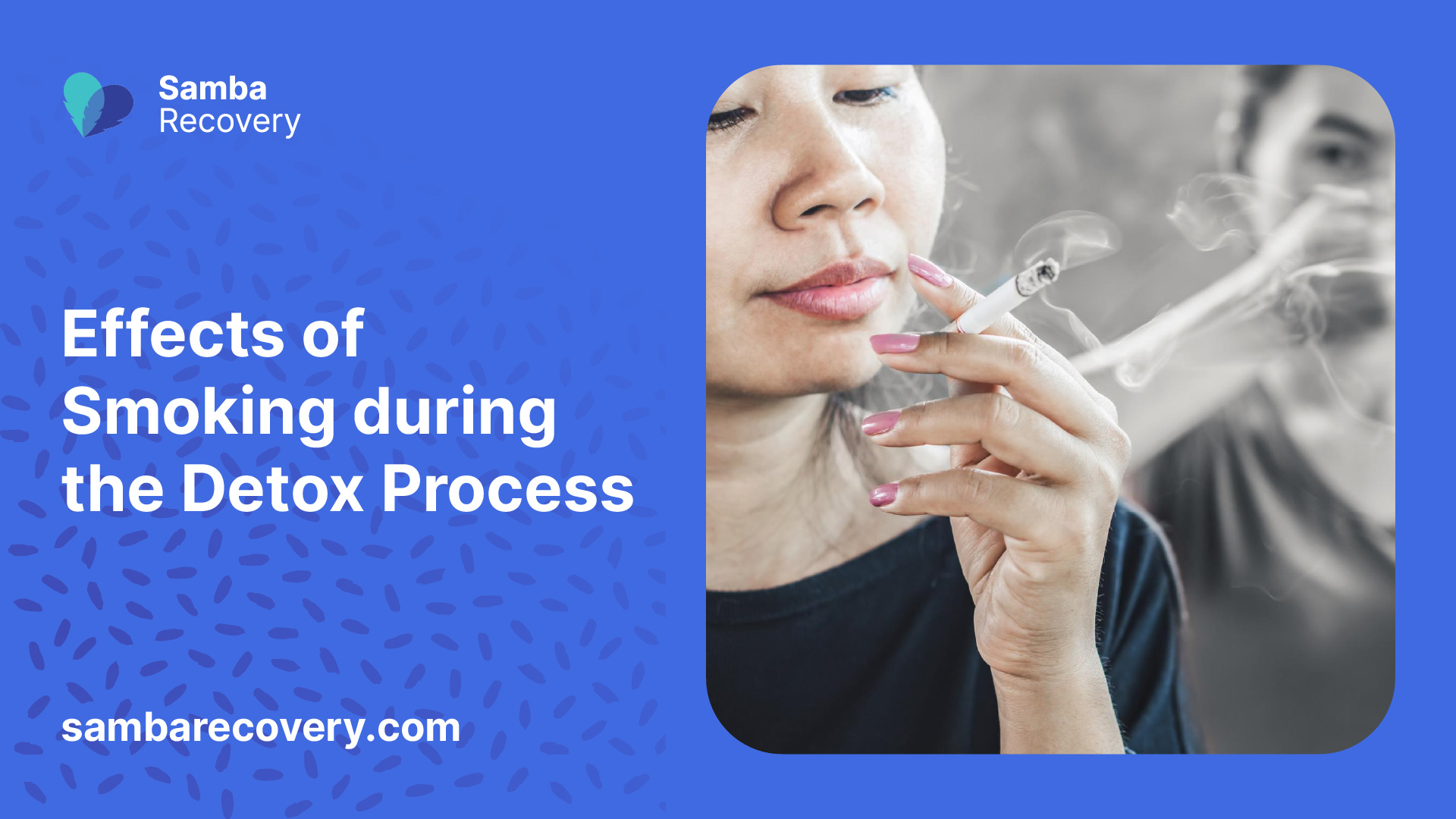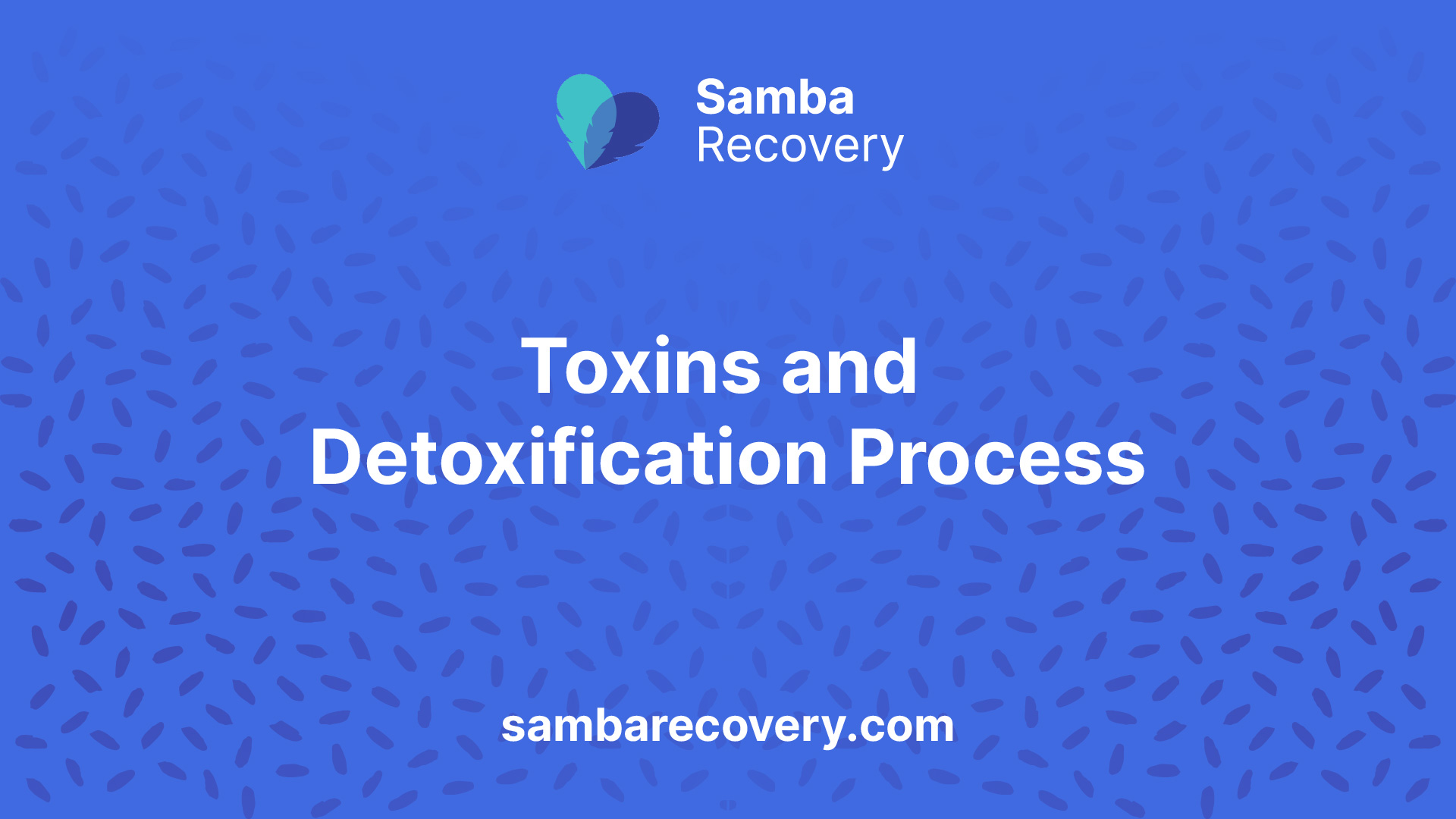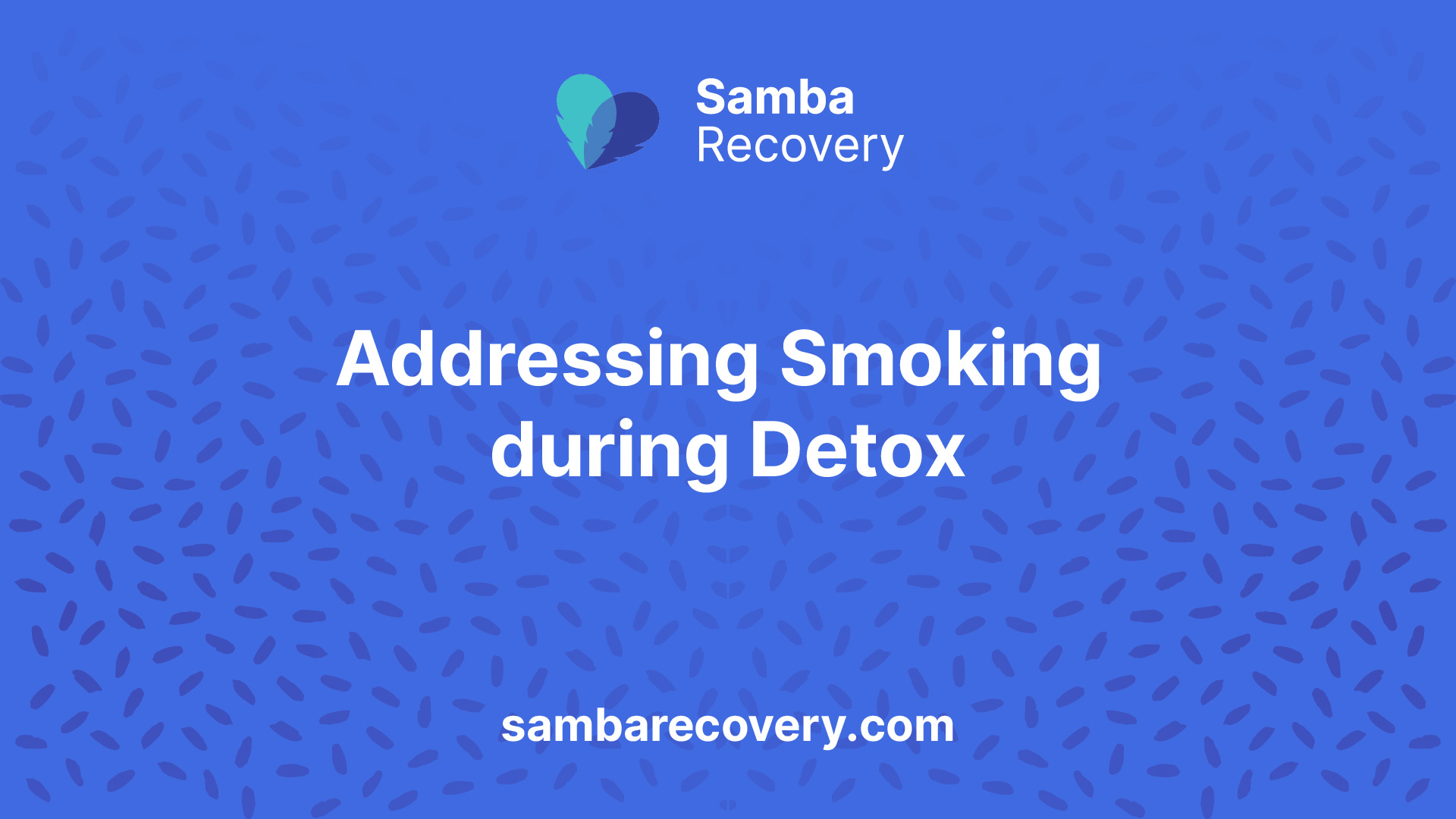
Impact of Smoking on Detox
Smoking during detoxification can have significant negative effects on the body’s ability to eliminate toxins effectively. This section covers how smoking impacts the detoxification process and the role of lung irritation in hindering toxin elimination.
Toxins and Detoxification Process

Smoking can introduce harmful toxins and chemicals into the body, potentially hindering the detoxification process itself. The toxins present in cigarettes can interfere with the body’s ability to efficiently eliminate other toxins accumulated from drug use or other sources [1]. This interference can slow down the detox process and add more harmful substances to the body.
| Substance | Toxins Introduced (mg) |
|---|---|
| Nicotine | 1.2 |
| Tar | 10 |
| Carbon Monoxide | 5.5 |
The table above shows the typical toxins introduced into the body with each cigarette smoked. The presence of these additional toxins creates an extra burden on the body’s detoxification systems, making it harder to eliminate existing toxins from drug use or other sources.
Lung Irritation and Toxin Elimination
Smoking can irritate the lungs and impair their ability to effectively eliminate toxins. The inhalation of smoke can lead to inflammation and damage to lung tissue, making it harder for the lungs to perform their natural detoxification role [1]. Additionally, smoking can constrict blood vessels and reduce blood flow, hindering the delivery of nutrients and oxygen to organs involved in detoxification, such as the liver and kidneys.
| Organ | Role in Detoxification | Impact of Smoking |
|---|---|---|
| Lungs | Eliminate toxins through respiration | Inflammation, reduced function |
| Liver | Metabolizes toxins | Reduced blood flow, impaired function |
| Kidneys | Filters toxins from blood | Reduced blood flow, impaired function |
The table above highlights the roles of key organs in detoxification and how smoking impacts their function. By hindering the performance of these organs, smoking can exacerbate the detox process, making it less effective.
Understanding the detrimental effects of smoking during detox is crucial for individuals seeking a unique rehab center in Georgia. For more information on related topics, visit our articles on what are the signs that my body is detoxing? and can you get a fever from detoxing?.
Effects on Liver Function
Smoking during detoxification has significant effects on liver function, primarily due to the liver’s role in metabolizing nicotine and other substances. Understanding these effects is crucial for anyone considering smoking while detoxing.
Metabolism of Nicotine
The liver is an essential organ for detoxification, playing a significant role in metabolizing nicotine, the addictive substance in cigarettes. When nicotine enters the body, the liver’s enzymes work to break it down into various metabolites. This process can be demanding, particularly during detoxification when the liver is already working hard to eliminate other toxins.
| Substance | Metabolite | Enzyme |
|---|---|---|
| Nicotine | Cotinine | CYP2A6 |
| Alcohol | Acetaldehyde | ADH & ALDH |
| Caffeine | Paraxanthine | CYP1A2 |
The liver’s focus on metabolizing nicotine can compromise its ability to eliminate other toxins effectively. This can impede the overall detox process, raising questions about whether smoking is advisable during detoxification.
Altered Metabolic Processes
Smoking impacts liver enzymes involved in detoxification, leading to altered metabolic processes. These changes can hinder the body’s ability to break down and eliminate toxins effectively [2]. The introduction of harmful toxins and chemicals through smoking can interfere with the liver’s efficient detoxification of accumulated toxins.
| Effect | Impact on Detox |
|---|---|
| Enzyme Alteration | Slower metabolism of toxins |
| Nicotine Metabolism | Reduced focus on other toxins |
| Chemical Interference | Impaired detoxification efficiency |
These altered metabolic processes can complicate the detox process, making it more challenging for the body to eliminate toxins effectively. This is particularly concerning for individuals seeking a unique rehab center in Georgia, where a comprehensive detox plan is essential for recovery.
By understanding the effects of nicotine metabolism and altered metabolic processes, individuals can make informed decisions about smoking during detox. It is essential to consider the liver’s crucial role in detoxification and the potential complications that smoking can introduce. For those who need guidance on addressing smoking during detox, our article on strategies for smoking cessation offers valuable insights.
Interaction with Medications
Compromising Medication Effects
Smoking during the detox process can have significant interactions with medications prescribed to support detoxification. The chemicals in cigarettes, including nicotine, can affect the metabolism and effectiveness of these medications, potentially compromising their intended effects [1].
When considering the question, “can you smoke while detoxing?,” it’s crucial to understand how nicotine interacts with detox medications. Nicotine can induce certain liver enzymes that metabolize drugs, leading to altered drug levels in the body. This can either reduce the effectiveness of the medication or increase the risk of adverse effects.
| Medication Type | Interaction with Nicotine | Potential Effect |
|---|---|---|
| Antipsychotics | Increased metabolism | Reduced effectiveness |
| Antidepressants | Altered drug levels | Increased side effects |
| Opioid replacement therapies | Induced metabolism | Decreased efficacy |
Sources: Conifer Park
The interaction between smoking and medications can hinder the detox process, making it more challenging for individuals to achieve successful outcomes. For example, nicotine can increase the metabolism of antipsychotics, reducing their effectiveness and potentially leading to a relapse in symptoms. Similarly, antidepressants may have altered levels in the presence of nicotine, increasing the risk of side effects or reducing their therapeutic benefits.
To mitigate these issues, it’s important for individuals undergoing detox to address their tobacco use. Quitting smoking not only enhances the effectiveness of detox medications but also reduces the overall health risks associated with smoking. For more information on detox-related complications, visit our article on can detoxing cause bleeding?.
Overall, addressing smoking during the detox process is essential for optimizing medication effectiveness and ensuring a smoother detox journey. For strategies and tips on quitting smoking, check out our section on support for tobacco use treatment.
Risk of Relapse
Cravings Triggered by Smoking
Smoking during the detox process can significantly increase the risk of relapse. Individuals often wonder, “can you smoke while detoxing?” The answer is complex, as smoking can trigger cravings for other addictive substances, making it more challenging for individuals to remain abstinent. Understanding these triggers is crucial for those seeking a unique rehab center in Georgia.
Research indicates that smoking during treatment is linked to higher numbers of cigarettes smoked at follow-up, suggesting an increased relapse risk [2]. This is particularly concerning for individuals detoxifying from opioids, as smoking can exacerbate withdrawal symptoms and cravings. Studies have shown that inpatient smokers exhibit higher opioid cravings and lower detoxification completion rates compared to nonsmokers [2].
| Factors | Impact |
|---|---|
| Smoking During Detox | Increased risk of relapse |
| Number of Cigarettes Smoked at Follow-Up | Higher in those who smoked during detox |
| Opioid Cravings | Higher in smokers |
| Detox Completion Rates | Lower in smokers |
Smoking not only triggers cravings for nicotine but also for other addictive substances, complicating the detox process. This can lead to a vicious cycle where the individual struggles to break free from multiple addictions simultaneously. For instance, those undergoing opioid detoxification who continue to smoke may experience intensified withdrawal discomfort and cravings, making it harder to stay off opioids [2].
Addressing tobacco use during detox is essential for improving treatment outcomes. Strategies like Very Low Dose Naltrexone (VLNTX) added to a methadone taper have been effective in reducing both opioid and cigarette cravings during detox.
In summary, smoking during detox can significantly impact the success of the detoxification process. By understanding the triggers and implementing comprehensive treatment strategies, individuals can improve their chances of a successful recovery. For more tips on managing detox symptoms, visit our articles on can you get a fever from detoxing? and why does alcohol give me night sweats?.
Health Risks and Complications
Understanding the health risks and complications associated with smoking during the detox process is crucial, especially for individuals seeking a unique rehab center in Georgia. Smoking can significantly impact the body’s ability to detoxify and heal.
Blood Flow Impediments
Smoking can constrict blood vessels, leading to reduced blood flow throughout the body [3]. This constriction hinders the delivery of essential nutrients and oxygen to vital organs involved in detoxification, such as the liver and kidneys.
| Effect of Smoking | Impact on Blood Flow |
|---|---|
| Blood Vessel Constriction | Reduced Blood Flow |
| Nutrient Delivery | Hindered |
| Oxygen Delivery | Compromised |
A healthy blood flow is essential for nutrient delivery and overall wellness. With compromised blood flow, organs responsible for detoxification may struggle to function optimally, hindering the overall detox process.
Impact on Organ Function
The impact of smoking on organ function is profound. Reduced blood flow can impair the liver and kidneys, which are crucial for detoxification. These organs require a steady supply of nutrients and oxygen to process and eliminate toxins from the body. When smoking constricts blood vessels, it reduces the efficiency of these organs, making the detox process less effective.
| Organ | Impact of Reduced Blood Flow |
|---|---|
| Liver | Impaired Detoxification |
| Kidneys | Reduced Toxin Elimination |
Addressing smoking during detox is vital for ensuring a successful detox process. Strategies for smoking cessation and support for tobacco use treatment are essential components of any detox program. For additional guidance, read our article on can detoxing cause bleeding?.
Addressing Smoking during Detox

Strategies for Smoking Cessation
Smoking during detox can trigger cravings for other addictive substances, making it more challenging for individuals to stay off drugs or alcohol during the detox process. Individuals who smoke during detox are more likely to experience relapse compared to those who do not smoke [1]. To effectively address smoking during detox, several strategies can be implemented:
- Nicotine Replacement Therapy (NRT): Options such as nicotine patches, gums, and lozenges can help manage withdrawal symptoms and reduce cravings.
- Behavioral Therapy: Counseling and behavioral therapies can provide support and coping mechanisms for managing cravings.
- Medications: Prescription medications such as bupropion and varenicline can aid in smoking cessation by reducing cravings and withdrawal symptoms.
- Support Groups: Joining support groups can provide a sense of community and encouragement, aiding in the cessation process.
Support for Tobacco Use Treatment
Supporting tobacco use treatment during detox is vital to improve overall outcomes and reduce the risk of relapse. Smoking during detox can interact with medications prescribed to support the detoxification process. The chemicals in cigarettes, including nicotine, can affect the metabolism and effectiveness of certain medications, potentially compromising their intended effects [1].
| Treatment Option | Description | Benefits |
|---|---|---|
| Nicotine Replacement Therapy (NRT) | Nicotine patches, gums, lozenges | Reduces cravings, manages withdrawal |
| Behavioral Therapy | Counseling sessions | Provides coping mechanisms, emotional support |
| Medications | Bupropion, Varenicline | Reduces cravings, eases withdrawal symptoms |
| Support Groups | Community support | Encouragement, shared experiences |
Smoking during detoxification is associated with increased opioid withdrawal discomfort and higher cravings for opioids and cigarettes. Individuals who smoke during detox may experience elevated cravings for both opioids and cigarettes, complicating the detox process and potentially leading to higher relapse rates.
It’s essential to address smoking during detox to ensure a smoother detoxification process and better long-term recovery outcomes. For more information on specific strategies and support options, check out our article can you get a fever from detoxing?.
References
[1]: https://www.newhorizonscentersoh.org/blog/can-you-smoke-while-detoxing
[2]: https://www.coniferpark.com/blog/can-you-smoke-while-detoxing
[3]: https://www.coniferpark.com/blog/can-you-smoke-while-detoxing/






